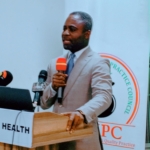
Minister for Health, Kwabena Mintah Akandoh, has urged members of the Traditional Medicine Practice Council (TMPC) to adhere to standards in their practices.
He said traditional medicines, also known as herbal medicines, continued to be an important alternative for Ghanaians, but strict adherence to their efficacy, quantity required, and hygienic processes has been a bane of the sector.
“One of the reasons traditional medicines have become an issue has been the lack of standards. You buy a herbal product and you don’t know the quantity to take. Sometimes the medicine is said to cure many ailments and diseases,” the Minister said.
He said this at a stakeholder meeting between the leadership of the Traditional Medicine Practice Council, representatives of practitioner associations and some other members with a focus on improving and creating value for the sector.
Mr Akandoh, who is also the MP for Juaboso Constituency, urged members of the Council to collaborate and invest in the sector as seen in jurisdictions like China and Indian.
He said Ghana’s traditional medicines sector could not reinvent the wheel but collaborate locally and internationally to get the best technology, expertise and machines for an advanced health care delivery.
“Your sector can grow the economy, it can play a significant role in the 24-hour economic agenda. Other countries are doing well on the backdrop of herbal medicines. We signed an MoU with India recently so you can follow up to see how they can help your members,” Mr Akandoh said.

On his part, Chairman of the TMPC Governing Council, Samuel Ato Duncan, said traditional and alternative medicine in Ghana had been a dynamic sector that had not only contributed to health care delivery but also job creation, rural development, export earnings, and cultural identity.
He said their knowledge systems had the potential to position Ghana as a centre of excellence for integrated health and wellness tourism in West Africa and called on members to ensure quality assurance, safeguards and safety, protection of biodiversity, professional practices and evidence-base therapies.
Mr Duncan said registrations, licensing protocols and Codes of Ethics of the Council had ensured qualified practitioners care and elevated standards, adding that their ongoing curriculum reviews for traditional medicine training institutions would align with best practices and integrate modern science.
“We must strengthen research partnerships, improve supply chains and enhance our visibility on both domestic and international markets.
“Partnerships with the Food and Drugs Authority on herbal medicine quality control and with the Ghana Standards Authority on production standards are necessary,” he said.
Mr Duncan, who is also the President of the Ghana Federation of Traditional Medicine Practitioners Associations (GHAFTRAM), said the TMPC would roll out a nationwide registration audit to update the practitioner database and weed out unqualified operators.
“We will also launch an annual Traditional Medicine Research Symposium, co-organised with Ghana’s leading universities to translate indigenous knowledge into validated therapies,” he added.
Some of the practitioner Associations that were present included GHAFTRAM, Herbalists, Traditional Birth Attendants, Complementary and Alternative Medicine, Naturopaths Association and other allied groups. There were also Officials from the Ministry of Health.